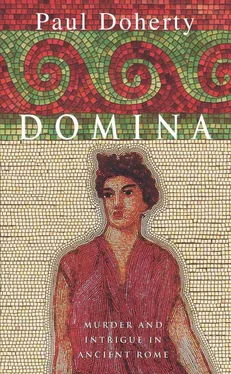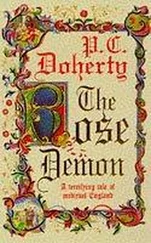Paul Doherty - Domina
Здесь есть возможность читать онлайн «Paul Doherty - Domina» весь текст электронной книги совершенно бесплатно (целиком полную версию без сокращений). В некоторых случаях можно слушать аудио, скачать через торрент в формате fb2 и присутствует краткое содержание. Год выпуска: 2012, ISBN: 2012, Издательство: Headline, Жанр: Исторический детектив, на английском языке. Описание произведения, (предисловие) а так же отзывы посетителей доступны на портале библиотеки ЛибКат.
- Название:Domina
- Автор:
- Издательство:Headline
- Жанр:
- Год:2012
- ISBN:9780755350490
- Рейтинг книги:3 / 5. Голосов: 1
-
Избранное:Добавить в избранное
- Отзывы:
-
Ваша оценка:
- 60
- 1
- 2
- 3
- 4
- 5
Domina: краткое содержание, описание и аннотация
Предлагаем к чтению аннотацию, описание, краткое содержание или предисловие (зависит от того, что написал сам автор книги «Domina»). Если вы не нашли необходимую информацию о книге — напишите в комментариях, мы постараемся отыскать её.
Domina — читать онлайн бесплатно полную книгу (весь текст) целиком
Ниже представлен текст книги, разбитый по страницам. Система сохранения места последней прочитанной страницы, позволяет с удобством читать онлайн бесплатно книгу «Domina», без необходимости каждый раз заново искать на чём Вы остановились. Поставьте закладку, и сможете в любой момент перейти на страницу, на которой закончили чтение.
Интервал:
Закладка:
‘Drink!’ he urged Agrippina.
She later told me that the grains of corn sparkled like diamonds whilst the water seemed to fire her blood. She lay back again, as Joah made signs over her face and the phenomena disappeared. We were just in an ill-lit, dank room with the mother of the Emperor of Rome lying on a dirty floor. Joah helped Agrippina to her feet and kissed her fingers.
‘Well?’ Agrippina demanded.
‘It is finished,’ Joah murmured, stepping back. ‘Another woman will take your place.’
‘Acte?’ Agrippina spat out.
Joah shook his head. ‘No, another woman!’
We left that magician’s house and returned to the Palatine, where Agrippina brooded for days. Joah was either a true prophet or possibly just a very shrewd observer of court affairs. The open opposition, behind which I could detect Seneca’s hand, began with murmurs and whispers. Court cases were begun against her and the Emperor railed that his palace was becoming a meeting place for her litigants. He visited his mother less and less and eventually it was tactfully suggested that Agrippina should leave the palace and move to a nearby house. She had no choice but to obey. Although she was allowed to take her possessions, the guards were withdrawn: she was no longer a member of the imperial circle.
Nero seemed intent on demonstrating to his mother the depths of his decadence. He organised an elaborate, mock naval engagement on an artificial lake of salt water but the display got out of hand and many of the sailors were killed: Nero declared himself disgusted with such bloodshed. He next staged a ballet of the Minotaur legend with an actor disguised as a bull actually mounting another playing the role of Pasiphaë. The crowd were treated to the sight of the bull copulating with the hind quarters of a hollow heifer. At night Nero, disguised in a cap or a wig, prowled the streets and the taverns looking for mischief. Occasionally he’d visit the theatre in a sedan chair to watch the quarrels amongst the pantomime actors, joining in when they came to blows and fought it out with stones and broken benches. His feasts started at noon and would last till dawn, with an occasional break for swimming in warm baths or, if it was summer, snow-cooled waters. On one occasion he floated down the Tiber to Ostia and arranged for a row of temporary brothels to be erected along the shore in which married women, pretending to be inn-keepers, solicited him for custom. He never wore the same clothes twice and would stake thousands of gold pieces on the throw of a dice. He always insisted on being accompanied by a lavishly garbed retinue, and even the mules of his pack train were shod with silver.
Agrippina tried to hide herself away from all this but Nero kept up the insults. He would send her mushrooms, calling them ‘the Food of Gods and Goats’ and taunted her by granting Locusta a house in Rome as well as country estates. He despatched lawyers and their clerks to stand under her window, disturbing her with jeers and cat-calls. Mysterious gifts of food arrived, some of them blatantly poisoned.
I tired of this nonsense and opened my treasure chests to hire bodyguards, who drove away the litigants and ensured that any gifts brought to the house were immediately destroyed. Agrippina’s hair began to turn grey, and her face became gaunt as she lost weight. Nero had perfected his sadistic teasing of her. He would visit Agrippina in a profuse show of solicitude and concern, and build up her hopes, as he sat at her feet, wide-eyed, listening to her advice. Then he would jump to his feet, crowing with laughter, and leave, mimicking what she had said.
Agrippina, now full of guilt over Britannicus’s death, also tried to comfort the young Octavia, who was in a parlous state: her face was ashen and, in spite of her youth, she was losing clumps of hair from worry. Terrified of what had happened to Britannicus, she refused to leave her chamber, and would fret herself sick if her nurse, an old family retainer, left her sight.
Agrippina tried to fight back but Nero’s cruelty became even more barbed. I was in the Forum when I first heard rumours that Nero had been seduced by his own mother. On investigating these stories, I discovered that Nero had paid his servants to ransack the brothels of Rome until they found a woman who looked remarkably like Agrippina. Nero then had the woman dressed in his mother’s clothes, and would sit closeted with her in his litter. When he emerged, people could tell from the stains on his tunic and his air of dishevelment that, as one wit put it, ‘he’d not been discussing the problem of Parthia!’. I tried to protect Domina but Nero ensured such rumours reached her, and in despair she took to her bed, refusing food and drink.
I called on the services of every physician and quack in Rome, but they examined her and walked away, shaking their heads. Nero’s game became more intense, and he sent the woman masquerading as his mother to the house. I intervened and courteously turned her away. It was a chilling experience: she was the image of Agrippina until she opened her mouth and spoke, displaying her blackened teeth. At last I decided to sue for terms. For days I kicked my heels outside Seneca’s office until that wily, old Spaniard granted me an audience. He studied me with black, hooded eyes, a faint smile on his lips.
‘Your mistress will know peace, Parmenon, once she leaves both the Emperor and Rome alone.’
‘Exile?’ I asked.
‘When she leaves Nero and the Empire alone,’ he said, flicking his hand as a sign of dismissal.
By the end of the week, despite her feeble protests, Acerronia and I put Agrippina in a litter. We packed whatever possessions we could and took the road to Antium. Perhaps I should have waited for Nero was soon distracted from his cruel games against his mother, not by Acte, but by the new love of his life, the beautiful, exquisite Poppea. By that time, however, we were out of Rome. Agrippina began to recover even before we reached Antium, curious about where we were going and mocking what little retinue the Emperor of Rome’s mother possessed.
So we came to Antium, and enjoyed soft summer days, good food and delicious wines, and Agrippina took a new lover, Callienus, a Greek actor. We became accustomed to spending more and more of our afternoons together in the garden, reminiscing about the past and wondering about the future. Even then Agrippina was still convinced that her son’s love was only dormant, not dead. Because of that, she accepted Nero’s invitation to Baiae and that last, splendid feast. Because of her deep unconditional love for her monster of a son, she took ship across the Bay of Naples at night and was almost drowned by his minions. In the end, because of her all-consuming love, she and I sheltered in a dark, cold villa and waited for her beloved son to finish the task he had begun.
Chapter 15
‘With you I would love to live,
With you I’d willingly die’
Horace, ‘ Odes ’ III. 9. 24.Whilst we sat and reminisced, Nero and his cronies put their heads together. I later found out exactly what had happened: after all, I was the man who assisted both Burrus and Seneca to end their lives. Oh yes, Agrippina was pushed into eternal night but I became the nemesis of those who had plotted her downfall.
After his mother left on the bireme, Nero was as happy as a lark on a spring morning. He closeted himself in his private dining chamber at Baiae, his minions around him. He was already preparing the funeral speech, in which he would praise Agrippina’s virtues and berate Neptune for taking the ‘best of mothers’ from him. He lounged on his couch whilst Anicetus sniffed at a garland of flowers. As the evening wore on, Nero became more restless, until at last a messenger arrived, the freedman Agerinus, who, although a member of our household, was a born informant. He’d been picked up by the trireme, and although suspicious, was still not sure whether the accident was genuine or arranged. He threw himself at Nero’s feet, blurting out, ‘The Empress, your beloved mother, has had an accident! The boat sank but the Gods of sea and sky were with her, and she swam to safety. She sends word for you not to be anxious.’
Читать дальшеИнтервал:
Закладка:
Похожие книги на «Domina»
Представляем Вашему вниманию похожие книги на «Domina» списком для выбора. Мы отобрали схожую по названию и смыслу литературу в надежде предоставить читателям больше вариантов отыскать новые, интересные, ещё непрочитанные произведения.
Обсуждение, отзывы о книге «Domina» и просто собственные мнения читателей. Оставьте ваши комментарии, напишите, что Вы думаете о произведении, его смысле или главных героях. Укажите что конкретно понравилось, а что нет, и почему Вы так считаете.












